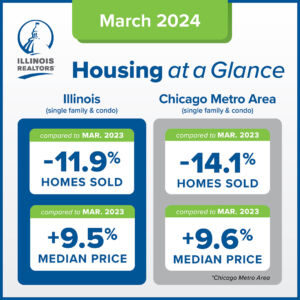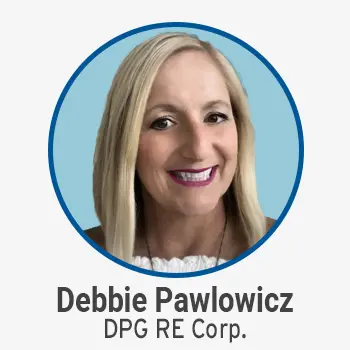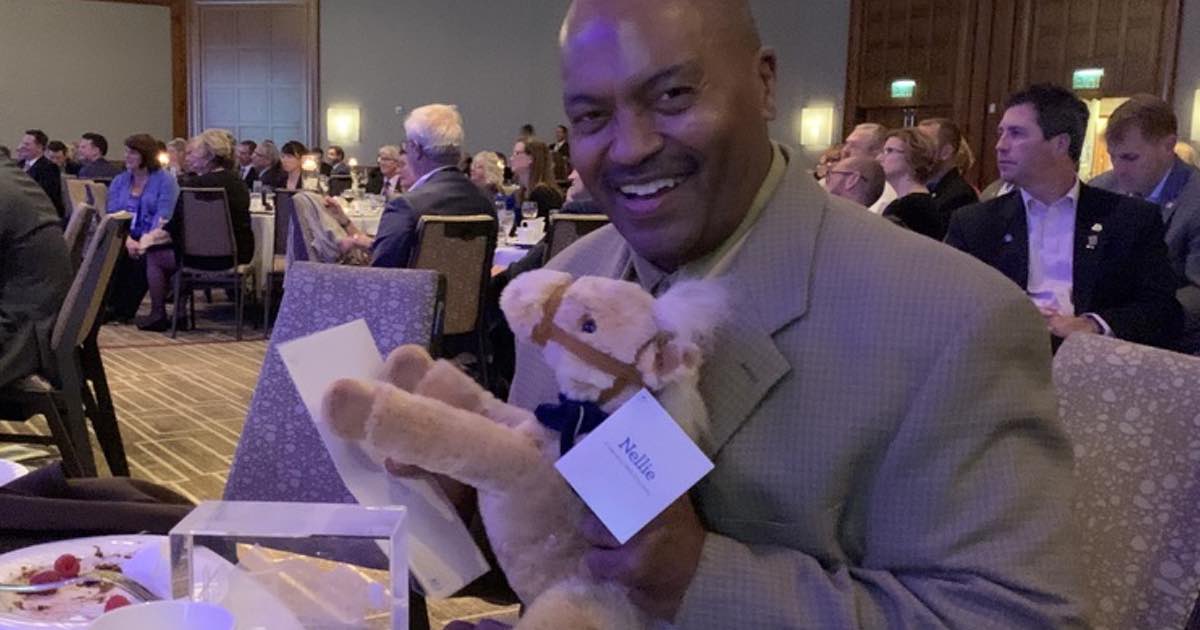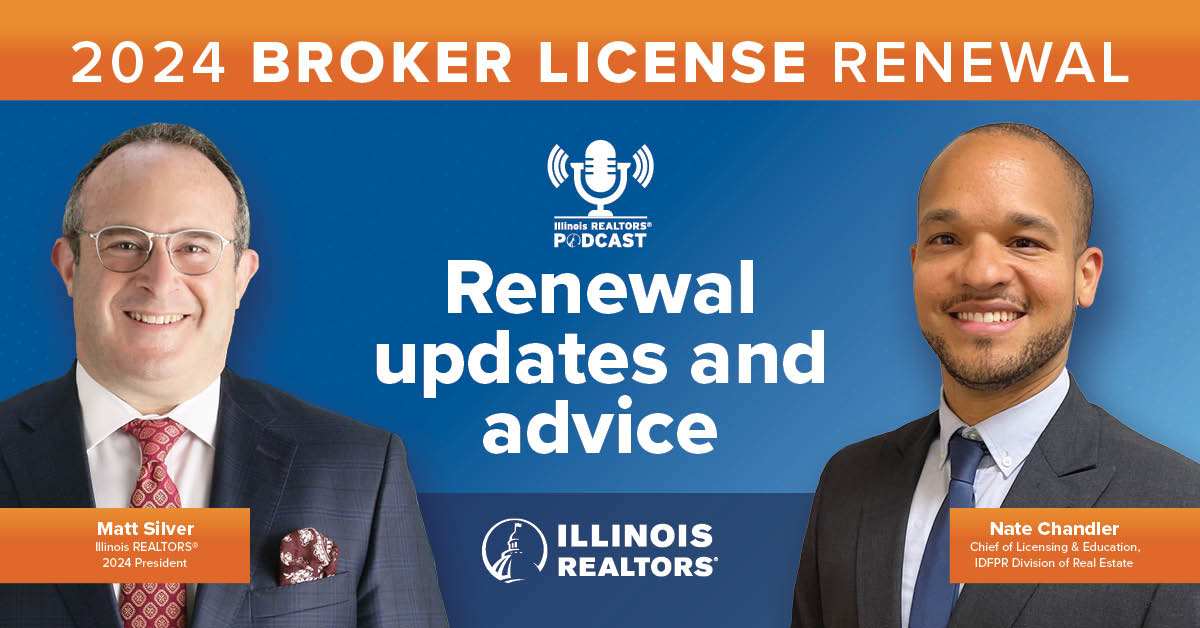Illinois REALTORS® features an interview with Dale Taylor, a New Lenox REALTOR® who was honored last week with the NAR Good Neighbor Award in San Francisco.
Taylor was honored for his work with South Suburban PADS, which seeks to help the homeless. Taylor devotes one night weekly to run a homeless shelter, and has been a tireless fundraiser for the organization.
Taylor’s selection resulted in a donation of $20,000 to South Suburban PADS.
A REALTOR® with RE/MAX 10 in New Lenox, Taylor says he treats all of those at the shelter with respect. “…That’s my ultimate goal, is if we can see them as a need to be supplied, then we don’t look at them as a nuisance,” he said.
The full transcript of the interview is below.
Illinois REALTORS® Podcast.
Interview with Dale Taylor, Good Neighbor Award Winner in San Francisco, Calif.
Jon Broadbooks: Hello, and welcome to the Illinois REALTORS® Podcast, coming to you today from the NAR conference and Expo in San Francisco. There are many awards handed out at NAR’s conferences, but one of the most significant is called the Good Neighbor Award. This award goes to REALTORS® who have gone to exceptional lengths to make their communities better, and today’s guest has certainly done that.
Jon: I am joined today with Dale Taylor, an Illinois REALTOR® who has spent nearly two decades helping homeless men at a shelter site, South Suburban PADS, and he manages this site in New Lenox, Illinois. In all, he’s raised more than $3 million for the shelter over the years, and he’s being honored for his work this week with a presentation and a dinner at the NAR conference. Dale is a broker with RE/MAX 10 in New Lenox. He’s a familiar face to many in the association, having served as chair of the Equal Opportunity and Cultural Diversity and Housing Opportunity work groups. Dale, welcome.
Dale Taylor: Oh, I’m so glad to be with you right now.
Jon: Yeah. This is such an honor. NAR, I am sure it gets hundreds, maybe even thousands of nominations for this award. But I have to say, yours really stood out. What prompted you to get involved with helping those who are homeless?
Dale Taylor: It started with a phone call that I received in … It was actually two phone calls from two close friends that I highly respect, and they came within five minutes of each other. They had informed me that the state of Illinois had given South Suburban PADS the former Tinley Park Mental Health Facility to house the Katrina survivors. And they asked me if I would be willing to spend the weekend cleaning up the facility to welcome them, and so I did. I was there when they flew everyone in. I watched people come with no shoes on their feet because they were picked right off on their roofs, and brought right to the Tinley Park Facility. Well, one of the things I liked about when they asked me to volunteer, they said, “You know, if you would just donate one day a month for a few hours, and own that day.”
Dale Taylor: And I thought, “Wow, they really care about my time.” And so I started that way, just giving a few hours once a month. Then I was asked for my resume and I said, “Why?” And they said, “Well, we think you would be a really great candidate to be a board member.” So I submitted my resume, and they asked me to serve on the board of directors. Then after that, the shelter manager approached me and she said, “Dale, I just acquired a new shelter and I’m really overloaded. Would you help me to co-manage it?” And that was her little sneaky way of training me to be a shelter manager. And I said, “Sure, no problem.” So after about six months, she said, “You know what? I think you got this down pat. Why don’t you just take it and run with it?” And so that’s how my life began as a shelter manager.
Jon: Tell me about South Suburban PADS. How did it start, and how has it evolved over the years? Because it offers a whole array of services.
Dale Taylor: It started with a group that coordinated about a dozen churches to provide emergency overnight shelter. As soon as they began to work on fundraising, they discovered that there were foundations and there were entities that were willing to give grant money to address specific needs. They realized that they could actually hire caseworkers, social workers who could address the needs of the guests and get the funding to do that kind of work.
Dale Taylor: And so it grew into a network of churches that provided the emergency overnight shelter. So, no one church would be overloaded with giving of their facility because they provide the brick and mortar and the utilities, and PADS provides the supplies and the volunteers. Then there’s the next level, because when those individuals that are experiencing homelessness are willing to meet with a social worker to determine exactly what their need is, it may be a health need. It may be just fine tuning a resume or specific job training skills that might be needed to get them on the road of stability. The case worker is there to guide their path. And those that desire to not live the life of experiencing homelessness, we have a network of very skilled staff to help them.
Jon: Dale, your day job is selling homes. Your job once a week, as you mentioned, I think it’s every Monday night in fact, is living among the homeless and serving them. How does this role helping the homeless shape your view of what you do for a living, which is sell real estate?
Dale Taylor: I find that when you’re experiencing homelessness, you really learn resilience because an individual could just give up and commit suicide. But these individuals have learned to what I call live under the radar. They’ve learned to survive and exist, and I learn something new from them all the time. One of the things that I do is I establish very early that this is an environment of peace, and they are my extended families. A lot of times if I need to correct them I can do it with a look, or sometimes I just remind them that, “We are in God’s house, so I need you to behave yourselves.” Other times I just remind them that, “When you’re with me, it is all about our taking care of one another.”
Jon: Now I don’t want people to think that your work at the shelter is a desk job, because it’s far from that. You mop floors, you clean. I’m just curious, what does a typical night like for you when you do your Monday shift?
Dale Taylor: Well, it begins before a typical night. Because one of the things I do is, as I mentioned earlier, I build a team of volunteers who I ask if you could give me one Monday a month, for three to four hours. That way you could put it in your calendar, and you know every first Monday you’re at the shelter. I do that also with my food team. So I have a first Monday food team, a second Monday food team, and so forth. And I try to get the food teams to also provide volunteers for the overnight shifts. Well, one of the challenges is just overnights. It’s very hard to get people to commit to that, especially if they work a day job. That requires me to make that commitment, to make sure that there is a responsible person there watching over everyone.
Dale Taylor: When the weather is decent, we might have 23 guests. But as it gets colder, we can accommodate as many as about 40. I would say we average probably about 35. I helped the food team prepare their budget by giving them the previous week’s census so that they can project. I work with them as far as … Some of them like to stay with a specific theme. I make sure that it’s a nutritious theme. I have one food team that they perfect chili every week. I have other food teams that have other themes as well. But to answer your question, how does it help me with real estate? Just the fact that I give respect to these individuals and I let them know that they’re valued. They never ever feel that they are a problem to life. I make them know that they’re cared for, and all of that falls into the arena of customer service. It just helps me to fine tune my customer service skills through serving that population.
Jon: Well, it’s clear from the video, and I encourage anybody has an opportunity to watch the video on the work that you’ve done. It’s really something. It’s clear that you see this outreach really is about building relationships, as you said. And as you put it, it seemed truly natural for somebody who is a REALTOR®.
Dale Taylor: Yeah. Because we’re in the serving business, and also we’re in the sowing and reaping business. When I use the word sowing, when people focus on prospecting for new business, that’s a form of sowing. When you’re serving a client and and you serve them well and you help them to achieve their goal, that’s a form of sowing. The reaping is the commissions that you earn and the referrals that may be generated by serving a client very well. And likewise, in serving the less fortunate.
Dale Taylor: It is a form of sowing, you’re sowing into a life and helping people to … Some people just need to do some fine tuning. This is a temporary situation, and the very fact that they had someone to care enough to help them to redirect their focus and set some goals. I call it step by step, line upon line, precept upon precept.
Dale Taylor: If you just make the first step and … When I’m working with my clients, I will share with them, “I may never fully prepare you for the experience of buying or selling real estate. It is a step by step process. But the one thing that you will know is that I’m going to be right there with you through every step to guide you. And whatever you’re going to go through, I’m going to be right there going through it with you.” And when people know that you have that level of caring for them, it produces such a great harvest.
Jon: What do you see as the best way for people, and particularly REALTORS®, to get involved with helping with this challenge of helping the homeless? Because it sometimes can be hard, I would think, to get people engaged on this.
Dale Taylor: I have a presentation to do tomorrow, and I’ve been thinking about how can I make people really feel what homelessness feels like. I’ve used the word resilience. And if people can really focus on what that word really means, it you have to be a strong person to endure homelessness because you’re dealing with a lot of rejection, a lot of shame, a lot of people looking down at you. Just basic things like staying clean. There are so many challenges. When I look at my colleagues, one of the things that I talk about is the power of spare change. You would be amazed at what just the spare change that you save, releasing that. It can hire a case worker who can help an individual to change their lives. Your valuable time, just donating an extra three to four hours once a month on an overnight shift.
Dale Taylor: I have had guests just come and sit with me because they can’t sleep. And just the fact that they’ve got my ear and they have someone that is willing to listen, and I recognize that there’s a … One of my favorite singers, Gladys Knight, in one of her songs, she says, “Believe half of what you see and none of what you hear.” I know a lot of times I’m getting half the truth, but the very fact that I’m listening and allowing them to communicate. And then when the moment is right, I can toss in a little bit of wisdom. So you never know when you give somebody just a few hours of your time, and you hear and then you share. You inspire.
Jon: So Dale, you’ve raised I think $3 million in all for PADS over the 14 years you’ve been involved with this program. And with this award, NAR is donating an additional $10,000 to the shelter program. Were you surprised to learn you’d been nominated for this?
Dale Taylor: It’s a funny thing. I have to mention a good friend, his name is Ahmed Badat. It’s a funny thing how life works. About two weeks before it was time for me to submit that application, some kind of way he would come across my path and he would say, “Dale, you’re going to submit that application.” And I said, “Yes. Ahmed.” Because it’s a good five to six pages of really thorough information. And every time I would prepare it, I would just say a little prayer. And that would be, “I know you’re going to put this before the right eyes.” And year after year I would submit it and nothing would happen. And then in 2018, Sarah, who runs the Good Neighbor Award, she reached out to me and she said, “Dale, I watched the committee go over your application.”
Dale Taylor: She said, “We just need to kind of fine tune it.” And she said to me, she said, “I want you to think about every fundraising activity that you’ve ever been involved with the organization and over the years, and tally up what it really can …” And I was so amazed when I thought about it, because we would do a gala every year and that would generate at least $30,000. The Carson’s Community Day Coupon Books, I was doing that for numerous years, and that was generating two checks for the organization.
Dale Taylor: And so when I really tallied everything up and I’m like, “Wow, I actually helped raise that amount of money.” And then we talked about the impact, how many lives were changed. We counted up how many meals were prepared, something like 18,000 meals. How many shelter nights, it was nearly 700 shelter nights. And it’s funny. Because when you’re actually serving, you’re looking at each individual and the impact that you’re making on the person in front of you that you’re touching. So when I actually sat down and really calculated everything that I had participated in, it simply amazed me.
Jon: We’ve been talking with Dale Taylor, an Illinois REALTOR® who has been named the winner of NAR’s Good Neighbor Award. Dale’s being honored at the NAR convention here in San Francisco. That’s where we’re actually doing the recording for this. And Dale, thanks so much for being on the podcast and for being a good neighbor, and thank you for being an Illinois REALTOR®.
Dale Taylor: Jon, I want to thank the Illinois REALTORS® for giving this exposure, because I see this as another tool that enables people to see the experience of homelessness in a different perspective. And that’s my ultimate goal, is if we can see them as a need to be supplied, then we don’t look at them as a nuisance.
Jon: Dale, thanks again so much.




 Create professional development programs that help REALTORS® strengthen their businesses.
Create professional development programs that help REALTORS® strengthen their businesses.
 Protect private property rights and promote the value of REALTORS®.
Protect private property rights and promote the value of REALTORS®.
 Advance ethics enforcement programs that increase REALTOR® professionalism.
Advance ethics enforcement programs that increase REALTOR® professionalism.
 Protect REALTORS® by providing legal guidance and education.
Protect REALTORS® by providing legal guidance and education. Stay current on industry issues with daily news from Illinois REALTORS®, network with other professionals, attend a seminar, and keep up with industry trends through events throughout the year.
Stay current on industry issues with daily news from Illinois REALTORS®, network with other professionals, attend a seminar, and keep up with industry trends through events throughout the year.







